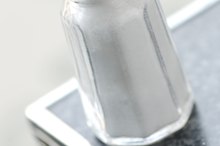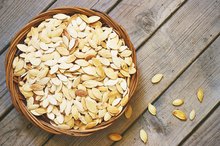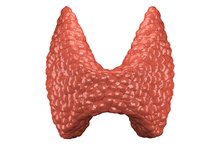Niacin & Thyroid Disease
The thyroid is a gland found on the front of the neck. It is responsible for secreting hormones that help to regulate body temperature, use energy and keep the organs functioning properly. The thyroid secretes several types of hormones. The main hormones produced by the thyroid gland are T3 and T4, also called thyroxine. The body also produces thyroid stimulating hormone, or TSH, which is a substance that lets the thyroid know how much T4 to create. Taking medications and some kinds of vitamin supplements, such as niacin, can affect the amount of thyroid hormones that your body makes.
Hypothyroidism
Hypothyroidism occurs when the thyroid does not create enough hormones to meet the body’s needs, either due to conditions such as autoimmune disorders, inflammation of the thyroid gland or reduced iodine intake. When this occurs, you must take thyroid supplements to correct the hormone balance, and some people need to take the supplements for life. Hypothyroidism typically causes symptoms of dry skin, malaise, fatigue and problems with memory. According to the American Thyroid Association, more than 50 percent of people who have hypothyroidism are not even aware that they have the condition.
- Hypothyroidism occurs when the thyroid does not create enough hormones to meet the body’s needs, either due to conditions such as autoimmune disorders, inflammation of the thyroid gland or reduced iodine intake.
Niacin
Levothyroxine & Fish Oil
Learn More
Also called vitamin B-3, niacin is a vitamin often found as part of supplements or in combination with other vitamins as part of a daily multi-vitamin. It can also be found in many different types of foods, including eggs, milk, yeast and fish. Supplemental niacin is often taken for vitamin B-3 deficiencies as well as for the management of high cholesterol because it helps to control triglyceride levels. People who take niacin often take doses of between 1,200 to 1,500 mg per day, but doses up to 3,000 mg per day may be necessary to help control cholesterol levels.
- Also called vitamin B-3, niacin is a vitamin often found as part of supplements or in combination with other vitamins as part of a daily multi-vitamin.
- Supplemental niacin is often taken for vitamin B-3 deficiencies as well as for the management of high cholesterol because it helps to control triglyceride levels.
Interactions
According to the Susan G. Komen Foundation, taking niacin may disrupt thyroid hormones, which may require an alteration dosage if you are taking thyroid replacement therapy 1. Niacin supplements may cause a drop in thyroid hormone levels, resulting in hypothyroidism. If you are taking niacin supplements as part of a regimen to reduce your cholesterol levels, you may experience lower levels of certain types of thyroid hormones, such as thyroxine, but not necessarily a reduction in all thyroid hormones. Because of this, you may not experience symptoms of hypothyroidism when taking niacin, but lab tests may reveal otherwise.
- According to the Susan G. Komen Foundation, taking niacin may disrupt thyroid hormones, which may require an alteration dosage if you are taking thyroid replacement therapy 1.
- Because of this, you may not experience symptoms of hypothyroidism when taking niacin, but lab tests may reveal otherwise.
Considerations
Why Am I Gaining Weight on Armour Thyroid?
Learn More
If you are seeking treatment for thyroid dysfunction, notify your doctor if you take niacin supplements. Your doctor should be aware of all medications and herbal supplements that you are taking in case of interaction between medications that may cause negative side effects or may reduce potency. Vitamin supplements, such as niacin, are available without a prescription but may not be carefully regulated. Some side effects of niacin include skin flushing, dry skin and itching, nausea, vomiting and diarrhea. If you experience negative side effects or you find that your thyroid condition is worsening while you are taking niacin, discontinue using this supplement and contact your doctor.
- If you are seeking treatment for thyroid dysfunction, notify your doctor if you take niacin supplements.
- If you experience negative side effects or you find that your thyroid condition is worsening while you are taking niacin, discontinue using this supplement and contact your doctor.
Related Articles
References
- Susan G. Komen For the Cure: Niacin
- Medline Plus: Niacin and Niacinamide (Vitamin B3)
- American Thyroid Association. General Information/Press Room.
- Pirahanchi Y, Jialal I. Physiology, Thyroid Stimulating Hormone (TSH). In: StatPearls [Internet]. Treasure Island (FL): StatPearls Publishing; 2019 Jan-. Updated April 25, 2019.
- AACC. Hashimoto Thyroiditis. Lab Tests Online. Updated October 18, 2019.
- DeGroot LJ. Graves’ Disease and the Manifestations of Thyrotoxicosis. [Updated 2015 Jul 11]. In: Feingold KR, Anawalt B, Boyce A, et al., editors. Endotext [Internet]. South Dartmouth (MA): MDText.com, Inc.; 2015.
- Nguyen QT, Lee EJ, Huang MG, Park YI, Khullar A, Plodkowski RA. Diagnosis and treatment of patients with thyroid cancer. Am Health Drug Benefits. 2015;8(1):30-40.
- Bindra A, Braunstein GD. Thyroiditis. Am Fam Physician. 2006;73(10):1769-76.
- Medeiros-Neto G. Multinodular Goiter. In: Feingold KR, Anawalt B, Boyce A, et al., editors. Endotext [Internet]. South Dartmouth (MA): MDText.com, Inc.; 2000-. Updated September 26, 2016.
- The National Institute of Diabetes and Digestive and Kidney Diseases. Hypothyroidism (Underactive Thyroid). Published August 2016.
- The National Institute of Diabetes and Digestive and Kidney Diseases. Hyperthyroidism (Overactive Thyroid). Published August 2016.
- Brent GA. Environmental exposures and autoimmune thyroid disease. Thyroid. 2010;20(7):755-61. doi:10.1089/thy.2010.1636
- Mcaninch EA, Bianco AC. The history and future of treatment of hypothyroidism. Ann Intern Med. 2016;164(1):50-6. doi:10.7326/M15-1799
- The National Institute of Diabetes and Digestive and Kidney Diseases. Grave’s Disease. Published September 2017.
- Stagnaro-Green, A., Abalovich, M, Alexander, E. et. al. Guidelines of the American thyroid association for the diagnosis and management of thyroid disease during pregnancy and postpartum. Thyroid. 2011(21)10. doi:10.1089/thy.2011.0087
- Liu G, Liang L, Bray GA, et al. Thyroid hormones and changes in body weight and metabolic parameters in response to weight loss diets: the POUNDS LOST trial. Int J Obes (Lond). 2017;41(6):878-886. doi:10.1038/ijo.2017.28
- Bahn R, Burch H, Cooper D, et al. Hyperthyroidism and other causes of thyrotoxicosis: Management guidelines of the American Thyroid Association and American Association of Clinical Endocrinologists. Endocrine Practice. 2011;17(3). doi:10.1089/thy.2010.0417
- Braverman L, Cooper D. Werner & Ingbar's The Thyroid, 10th Edition. WLL/Wolters Kluwer; 2012.
- Garber J, Cobin R, Gharib H, et. al. Clinical practice guidelines for hypothyroidism in adults: Cosponsored by the American Association of Clinical Endocrinologists and the American Thyroid Association. Endocrine Practice. 2012;18(6). doi:10.1089/thy.2012.0205
- Haugen A, Alexander K., Bible K, et. al. 2015 American Thyroid Association Management guidelines for adult patients with thyroid nodules and differentiated thyroid cancer. Thyroid. 2016;26(1):1-133. doi:10.1089/thy.2015.0020
- Smallridge R, Ain K, Asa S, et. al. American Thyroid Association guidelines for management of patients with anaplastic thyroid cancer. Thyroid. 2012;22(11). doi:10.1089/thy.2012.0302
- Wells, S, Asa S, Dralle H, et. al. Revised American Thyroid Association guidelines for the management of medullary thyroid carcinoma. Thyroid. 2015;25(6). doi:10.1089/thy.2014.0335
Writer Bio
Meg Brannagan has worked as a registered nurse for more than 10 years, specializing in women's and children's health. She holds a bachelor's degree in nursing from the University of Nebraska Medical Center.









